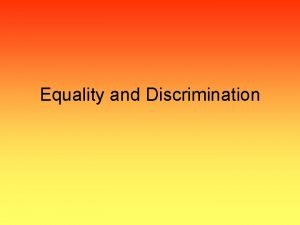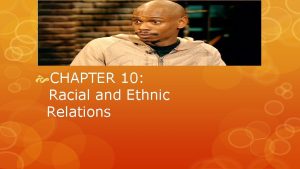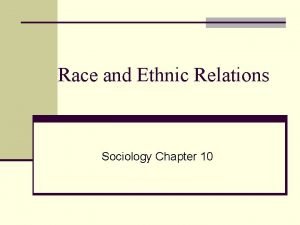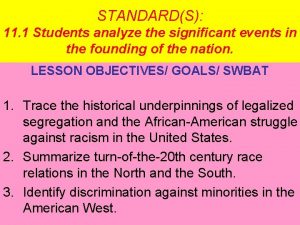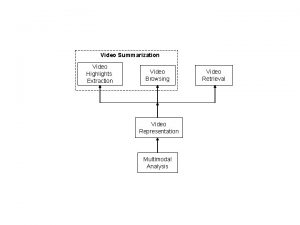EQUALITY SERIES RACIAL VILIFICATION Video and Education Resource









- Slides: 9

EQUALITY SERIES RACIAL VILIFICATION- Video and Education Resource

INTRODUCTION The AFL ‘Equality’ video series and resources have been developed by the Cultural Strategy & Education unit within the AFL to assist community football clubs around Australia in providing education to their players on key social issues. The series consists of 4 clips and accompanying resources. Each clip features a football or sport related personality discussing a social issue that has impacted them personally. The Equality Series includes the following clips: • HOMOPHOBIA – Jason Ball • MENTAL HEALTH – Simon Hogan • GENDER EQUALITY – Peta Searle • RACIAL VILIFICATION – Joel Wilkinson The clips and accompanying resources can be found on the AFL Respect and Responsibility webpage alongside the tabs that relate to the corresponding social issue. Within each tab, you will find a resource that provides information on how to present the education in your club, key questions to discuss, the key messages to get across and a fact sheet on the selected topic. The clips featured in this series are being used to educate and raise awareness across the AFL industry on the impact that discrimination and vilification can have on individuals and their families.

USING THE RESOURCE OPTION 1: YOUR OWN EDUCATION PURPOSE: To develop your own understanding and knowledge on these topics PREPARATION: Download clips and AFL social inclusion and equality resource which can be found on the AFL Respect and Responsibility website. MATERIALS: Laptop/PC TIMING: 10 -15 minutes per topic FORMAT: Watch the clip yourself. Think about the questions and read over the fact sheets to develop your own understanding of the issue OPTION 2: PLAYER EDUCATION (RECOMMENDED) PURPOSE: To educate players within your own club PREPARATION: Download the clip/s and Equality Resource (topic of your choice) MATERIALS: TV and/or projector, laptop, screen/blank wall, speakers, butchers paper and markers TIMING: 15 -20 minutes per topic including clip and discussion FORMAT: Show clip to the group and run activity/discussion as per the accompanying resource

RUNNING A SESSION PLAYER EDUCATION: HOW TO RUN A SESSION IN YOUR CLUB o Decide which clips you want to show. o Read over the fact sheet, discussion points and key messages of the clips you have chosen and familiarise yourself with the content. Think about the questions you may get asked. o Prepare any materials you need in advance – e. g. paper, pens, butcher’s paper and markers. o Organise a space for the session. Make sure it is private and without distractions, such as the club rooms. o If you think you need some support, request assistance from a local community worker/social worker/school teacher etc. to assist. o Allow enough time to work through each session. At least 20 minutes is recommended per clip. 5 minutes to show the clip and 15 -20 minute discussion time. Also allow enough time for questions from participants.

FACILITATOR TIPS RESPONDING TO DISCLOSURES • Continually throw questions to the group. If, as a facilitator, you are asked a question, don’t always answer it yourself. Throw the question to the group, It is very important to ensure that you have relevant support services referral information and phone numbers to pass onto your participants. National support services are listed under each topic in this resource but you may want to identify and allow that to spark or continue to drive discussion • important to stay calm and address the comment with respect. If possible, try local support services in your area. to suggest an alternate viewpoint or throw it to the rest of the group. It is When facilitating the sessions: Begin the session with a group agreement around respect. Four or five group rules Occasionally somebody might say something that stops you in your tracks. It is important not to enter into a public argument. • If you get a question that you don’t know the answer to, don’t are usually enough and may include; panic. Admit that you don’t know the answer. You do not want • Confidentiality –nothing leaves the room to lie or invent information that isn’t true, as you lose all • Listening and not interrupting • Showing respect for other people’s comments and opinions • Using third person -not telling personal stories • Choose how much to participate -it’s ok to pass on questions or opt out credibility. Reassure the person that you will follow up with them regarding the question after the session and that an answer will be provided in due time. • At the end of the session provide an opportunity for participants to follow up with yourself to provide information regarding support services, referrals and websites. YOU ARE NOW READY TO PLAY THE CLIP AND BEGIN YOUR SESSION

DISCUSSION POINTS RACIAL VILIFICATION KEY MESSAGES • No one deserves to be vilified or discriminated against QUESTIONS • Do you think society is getting too politically correct? • What impact did the vilification incidents have on Joel? • Does racism still exist in Australian society? • How to you think it would feel to be vilified on your race? • Vilifying someone ‘in the heat of the moment’ or ‘as a joke’ is no excuse • Racial vilification is used as a way for a perpetrator to feel that they are superior to the victim. • It doesn’t matter how a comment was intended by the person saying it, it all comes down to how the comment was received by others.

STATISTICS • Racism is the belief that human races have distinctive characteristics which determine their respective cultures, usually involving the idea that one’s own race is superior and has the right to rule or dominate others (Racism. No. Way, 2014). • Racism takes many forms, with the obvious being abusive language and violence but also can be discriminatory treatment, property damage or offensive materials. • Racism is believed to stem from fear of other cultures, low levels of education and a belief in white superiority (All Together Now, 2014). • The White Australian Policy. In the mid-19 th century in Australia there was a shortage of labour and Chinese and Pacific Islanders were brought to Australia as labourers. By the 1880’s the trade unions demanded a policy to ‘protect the White working man’ and preserve the purity of White Australia, and by 1890 all states had a legislation to exclude non-Europeans in its 1901 Immigration Restriction Act. • 1 in 5 people living in Australia have been a target of verbal racial abuse. Verbal abuse is the most common form of racism. • Nearly half of all Australian residents from a culturally and linguistically diverse background have experienced racism at some time in their life. • 7 in 10 teenagers have experienced racism. • 3 in 4 Indigenous Australians regularly experience racism. • 44% of Australians think they are a ‘casual’ racist but refuse to change. • 86% of Australians agree that something should be done to fight racism in Australia. • People who experience racism often have higher levels of depression and anxiety.

SUPPORT SERVICES ORGANISATION PHONE WEBSITE RACISM NO WAY http: //www. racismnoway. com. au/ RACISM. IT STOPS WITH ME http: //www. itstopswithme. humanrights. gov. au/ VEOHRC 1300 292 153 http: //www. humanrightcommission. vic. gov. au RELATIONSHIPS AUSTRALIA 1300 364 277 http: //www. relationships. org. au/

 Formal equality vs substantive equality
Formal equality vs substantive equality Cedaw article
Cedaw article Chapter 10 racial and ethnic relations review worksheet
Chapter 10 racial and ethnic relations review worksheet Chapter 10 racial and ethnic relations
Chapter 10 racial and ethnic relations Black studies and the racial mountain
Black studies and the racial mountain Chapter 10 racial and ethnic relations review worksheet
Chapter 10 racial and ethnic relations review worksheet Racial etiquette targets
Racial etiquette targets Racial wealth gap simulation
Racial wealth gap simulation Promoting racial literacy in schools
Promoting racial literacy in schools Frederick jackson turner thesis apush
Frederick jackson turner thesis apush
